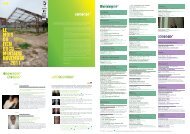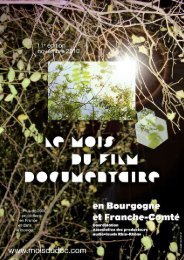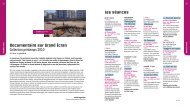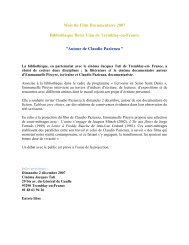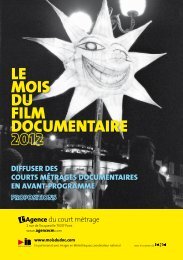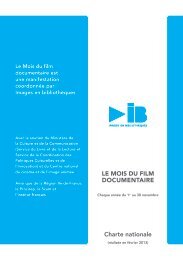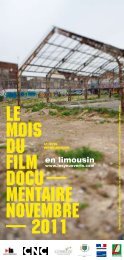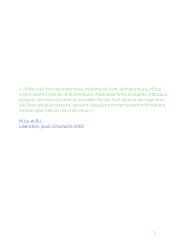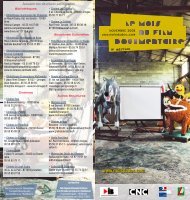catalogue de la vidéothèque d'acquisition / 2009 - Le Mois du Film ...
catalogue de la vidéothèque d'acquisition / 2009 - Le Mois du Film ...
catalogue de la vidéothèque d'acquisition / 2009 - Le Mois du Film ...
Create successful ePaper yourself
Turn your PDF publications into a flip-book with our unique Google optimized e-Paper software.
AMMA, LES AVEUGLES DE DAKAR / AMMA, THE BLIND OF DAKAR<br />
MAMADOU SELLOU DIALLO<br />
SOCIÉTÉ<br />
SOCIETY<br />
La jeune Astou, le patriche Mawdo, l’enfant Kiné, font partie <strong>de</strong>s aveugles<br />
mendiants qui prennent d’assaut <strong>la</strong> gran<strong>de</strong> mosquée <strong>de</strong> mon quartier<br />
lors <strong>de</strong> <strong>la</strong> prière <strong>du</strong> vendredi. Organisés, leur infirmité, leurs chants<br />
et leurs sermons sont les armes dont ils usent pour plus d’aumône. <strong>Le</strong><br />
film veut capter ce combat, entrer dans le mystère <strong>de</strong> ces aveugles,<br />
comme Bau<strong>de</strong><strong>la</strong>ire l’a fait dans son poème éponyme.<br />
Young girl Astou, grand old man Mawdo, the Kine child, they all belong to the<br />
begging blind who storm the great mosque in my neighbourhood every Friday<br />
for the Prayer. They are well organized and use their disabilities, songs and discourses<br />
to collect more alms. This film intends to capture their fight and penetrate<br />
the secret of the blind, as Bau<strong>de</strong><strong>la</strong>ire did in his poem entitled ‘The Blind’.<br />
52 MN / 2006 / DV CAM / SÉNÉGAL - FRANCE<br />
[› Versions disponibles / Avai<strong>la</strong>ble versions :<br />
- Wolof / Wolof<br />
- sous-titres français / French subtitles<br />
[› Distinctions / Awards :<br />
Mention spéciale <strong>du</strong> festival <strong>de</strong> Tarifa 2006<br />
ANGOLA – HISTOIRES DE LA MUSIQUE POPULAIRE /<br />
ANGOLA - TALES OF POPULAR MUSIC<br />
CULTURE / MSUIQUE<br />
CULTURE / MUSIC<br />
MÁRIO RUI SILVA , JORGE ANTÓNIO<br />
Dès les légendaires “Ngo<strong>la</strong> Ritmos” à <strong>la</strong> fin <strong>de</strong>s années 40, jusqu'au<br />
présent, ce film est un voyage par l’univers <strong>de</strong> <strong>la</strong> musique popu<strong>la</strong>ire<br />
ango<strong>la</strong>ise à travers <strong>la</strong> voix <strong>de</strong> ces plus importants artistes.<br />
Depuis les temps coloniaux jusqu’à maintenant, en passant par <strong>la</strong><br />
guerre <strong>de</strong> libération, l’indépendance et <strong>la</strong> postérieure guerre civile, ce<br />
film nous fait découvrir <strong>la</strong> musique popu<strong>la</strong>ire ango<strong>la</strong>ise dans le contexte<br />
<strong>de</strong> son histoire politique et sociale.<br />
Ce film est un document <strong>de</strong> référence et à portée internationale, pour<br />
<strong>la</strong> connaissance, <strong>la</strong> promotion et <strong>la</strong> divulgation <strong>de</strong> <strong>la</strong> musique et <strong>de</strong> <strong>la</strong><br />
culture ango<strong>la</strong>ise dans l’histoire <strong>de</strong> l’Afrique et <strong>du</strong> mon<strong>de</strong>.<br />
52 MN / 2005 / DV CAM / PORTUGAL<br />
[› Versions disponibles / Avai<strong>la</strong>ble versions :<br />
- Portugais / Portuguese<br />
This documentary takes us on a journey through Ango<strong>la</strong>n popu<strong>la</strong>r music; starting<br />
with such legendary greats from the <strong>la</strong>te 40s as Liceu Vieira Dias and Ngo<strong>la</strong><br />
Ritmos, right up to the present day. The voices and sounds of the most influential<br />
performers along the generations p<strong>la</strong>y against the back drop of Ango<strong>la</strong>’s political<br />
and social history.<br />
12



